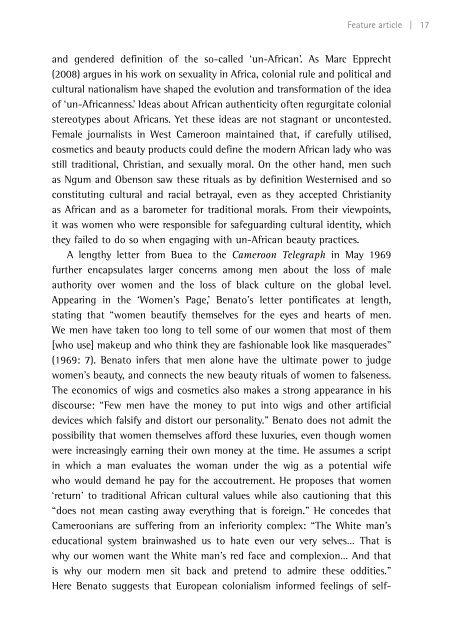The politics of fashion and beauty in Africa
fa21_proof_3
fa21_proof_3
You also want an ePaper? Increase the reach of your titles
YUMPU automatically turns print PDFs into web optimized ePapers that Google loves.
Feature article | 17<br />
<strong>and</strong> gendered def<strong>in</strong>ition <strong>of</strong> the so-called ‘un-<strong>Africa</strong>n’. As Marc Epprecht<br />
(2008) argues <strong>in</strong> his work on sexuality <strong>in</strong> <strong>Africa</strong>, colonial rule <strong>and</strong> political <strong>and</strong><br />
cultural nationalism have shaped the evolution <strong>and</strong> transformation <strong>of</strong> the idea<br />
<strong>of</strong> ‘un-<strong>Africa</strong>nness.’ Ideas about <strong>Africa</strong>n authenticity <strong>of</strong>ten regurgitate colonial<br />
stereotypes about <strong>Africa</strong>ns. Yet these ideas are not stagnant or uncontested.<br />
Female journalists <strong>in</strong> West Cameroon ma<strong>in</strong>ta<strong>in</strong>ed that, if carefully utilised,<br />
cosmetics <strong>and</strong> <strong>beauty</strong> products could def<strong>in</strong>e the modern <strong>Africa</strong>n lady who was<br />
still traditional, Christian, <strong>and</strong> sexually moral. On the other h<strong>and</strong>, men such<br />
as Ngum <strong>and</strong> Obenson saw these rituals as by def<strong>in</strong>ition Westernised <strong>and</strong> so<br />
constitut<strong>in</strong>g cultural <strong>and</strong> racial betrayal, even as they accepted Christianity<br />
as <strong>Africa</strong>n <strong>and</strong> as a barometer for traditional morals. From their viewpo<strong>in</strong>ts,<br />
it was women who were responsible for safeguard<strong>in</strong>g cultural identity, which<br />
they failed to do so when engag<strong>in</strong>g with un-<strong>Africa</strong>n <strong>beauty</strong> practices.<br />
A lengthy letter from Buea to the Cameroon Telegraph <strong>in</strong> May 1969<br />
further encapsulates larger concerns among men about the loss <strong>of</strong> male<br />
authority over women <strong>and</strong> the loss <strong>of</strong> black culture on the global level.<br />
Appear<strong>in</strong>g <strong>in</strong> the ‘Women’s Page,’ Benato’s letter pontificates at length,<br />
stat<strong>in</strong>g that “women beautify themselves for the eyes <strong>and</strong> hearts <strong>of</strong> men.<br />
We men have taken too long to tell some <strong>of</strong> our women that most <strong>of</strong> them<br />
[who use] makeup <strong>and</strong> who th<strong>in</strong>k they are <strong>fashion</strong>able look like masquerades”<br />
(1969: 7). Benato <strong>in</strong>fers that men alone have the ultimate power to judge<br />
women’s <strong>beauty</strong>, <strong>and</strong> connects the new <strong>beauty</strong> rituals <strong>of</strong> women to falseness.<br />
<strong>The</strong> economics <strong>of</strong> wigs <strong>and</strong> cosmetics also makes a strong appearance <strong>in</strong> his<br />
discourse: “Few men have the money to put <strong>in</strong>to wigs <strong>and</strong> other artificial<br />
devices which falsify <strong>and</strong> distort our personality.” Benato does not admit the<br />
possibility that women themselves afford these luxuries, even though women<br />
were <strong>in</strong>creas<strong>in</strong>gly earn<strong>in</strong>g their own money at the time. He assumes a script<br />
<strong>in</strong> which a man evaluates the woman under the wig as a potential wife<br />
who would dem<strong>and</strong> he pay for the accoutrement. He proposes that women<br />
‘return’ to traditional <strong>Africa</strong>n cultural values while also caution<strong>in</strong>g that this<br />
“does not mean cast<strong>in</strong>g away everyth<strong>in</strong>g that is foreign.” He concedes that<br />
Cameroonians are suffer<strong>in</strong>g from an <strong>in</strong>feriority complex: “<strong>The</strong> White man’s<br />
educational system bra<strong>in</strong>washed us to hate even our very selves… That is<br />
why our women want the White man’s red face <strong>and</strong> complexion… And that<br />
is why our modern men sit back <strong>and</strong> pretend to admire these oddities.”<br />
Here Benato suggests that European colonialism <strong>in</strong>formed feel<strong>in</strong>gs <strong>of</strong> self-



